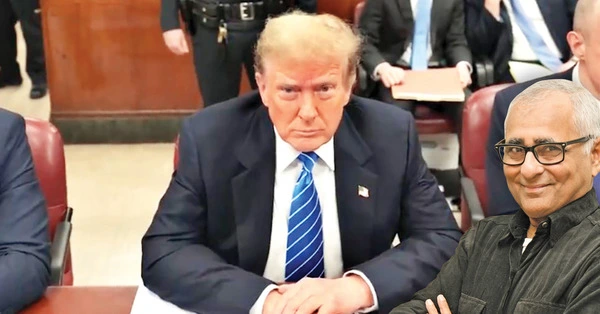By Inderjit Badhwar
In our tumultuous world, few stories possess the weight, complexity, and universal resonance of the one addressed in this issue’s cover story, authored by the esteemed Prof. Upendra Baxi. His article, Checkmate!, is not merely a legal commentary—it is a masterwork that dissects a moment in global jurisprudence, where the collision between political authority and judicial accountability could redefine democratic ethics and governance for years to come.
This case, centred on former US president and president-elect Donald Trump, unfolds as a multifaceted legal drama. It navigates questions of presidential immunity, judicial independence, and the constitutional principle that no one, not even the leader of a nation, is above the law. What makes this narrative so compelling is its global relevance: Trump’s legal battles are not an isolated American affair. They challenge the foundations of democratic governance, judicial impartiality, and constitutional ethics worldwide.
A Global Tussle for Democratic Accountability
Prof. Baxi adeptly contextualizes Trump’s legal entanglements as part of a larger, global struggle to define the limits of executive power. His discussion highlights the Manhattan court’s recent conviction of Trump for falsifying business records and its broader implications. The case stands as a stark reminder of the precarious balance between the exercise of political authority and judicial review—a balance that resonates far beyond the borders of the United States.
The core question posed by this case—whether a president-elect can claim immunity for unofficial acts—challenges foundational assumptions about accountability. Trump’s conviction has reignited debates about the scope of executive immunity, the role of the judiciary in holding leaders accountable, and the erosion of public trust in governance. These are debates that transcend the specifics of US law, bearing relevance to every constitutional democracy.
Judicial Integrity: A Universal Concern
Prof. Baxi eloquently draws parallels between the threats faced by American judges and those experienced in other democracies, including India. His invocation of Chief Justice Roberts’ concerns about intimidation, violence, and disinformation as threats to judicial independence mirrors challenges faced by judges globally. In India, too, cases like Sahara and the controversies surrounding CJI Ranjan Gogoi’s tenure have underscored the fragility of judicial integrity in the face of political pressures.
This is why Baxi’s analysis carries such weight. It reminds us that attacks on the judiciary are not isolated occurrences, but a growing global trend. Judicial independence is the cornerstone of democracy, and its erosion anywhere is a warning to all nations.
The Ethical Dilemma of Immunity
Another critical point raised by Prof. Baxi is the ethical and legal dilemma surrounding presidential immunity. Trump’s legal team’s arguments—that even as president-elect, he should enjoy immunity—touch on the delicate balance between executive privilege and judicial accountability. SCOTUS’ nuanced differentiation between “official” and “unofficial” acts further complicates the debate.
This case lays bare the dangers of granting unchecked immunity to leaders. As Baxi warns, allowing immunity for unofficial actions creates a precedent that could shield future leaders from accountability, enabling corruption, abuse of power, and erosion of public trust.
A Scholarly Triumph
As editor, I must take a moment to commend Prof. Baxi for his exhaustive and incisive examination of this case. His writing is a tour de force, weaving together legal theory, constitutional history, and global jurisprudence. Prof. Baxi’s ability to distill complex legal issues into a coherent narrative underscores his unparalleled expertise. His scholarship reminds us why we must engage with such issues—not as passive observers, but as active participants in the defense of democratic values.
Why This Matters to All of Us
This story is not just about Donald Trump or American politics; it is about the principles that underpin democracy everywhere. It forces us to confront questions that are deeply relevant in our own context:
• How do we safeguard judicial independence from political interference?
• Can we ensure that leaders, regardless of their stature, remain accountable to the law?
• How do we resist the normalization of authoritarianism under the guise of executive privilege?
India’s own challenges with judicial independence, executive overreach, and public accountability make this case a cautionary tale. The Trump saga serves as a mirror, reflecting the vulnerabilities of constitutional democracies worldwide.
A Call to Vigilance
As we reflect on Prof. Baxi’s profound insights, let us not treat this as a mere legal spectacle, but as a call to vigilance. The principles being tested in US courts today could easily become the battlegrounds of tomorrow in other democracies. The defense of judicial independence, the sanctity of the rule of law, and the accountability of leaders are struggles we all share.
Prof. Baxi’s work is a clarion call to legal scholars, policymakers, and citizens alike: our democracies are only as strong as our commitment to justice and accountability. Let us heed his wisdom and remain steadfast in upholding these principles—before it is too late.


